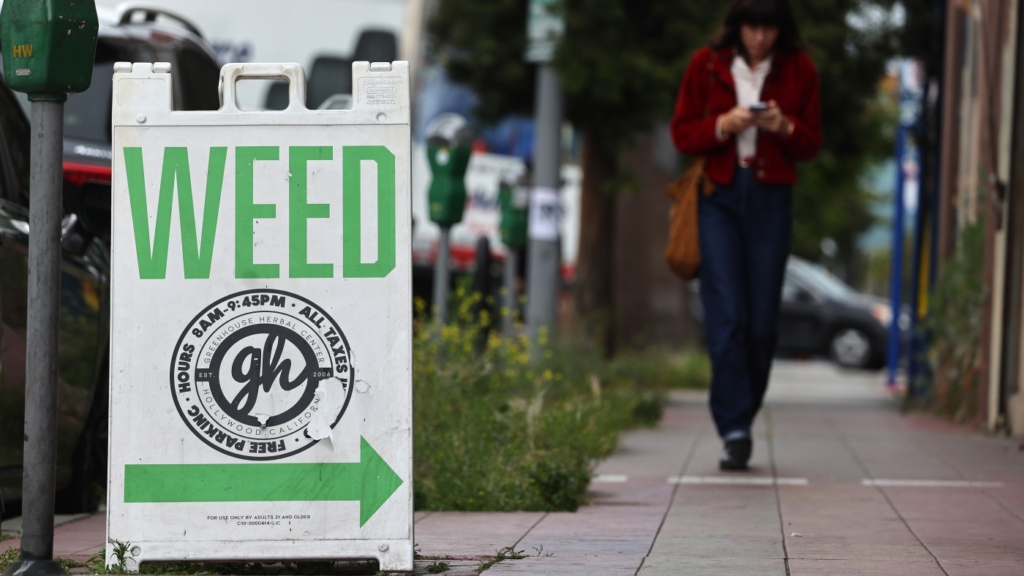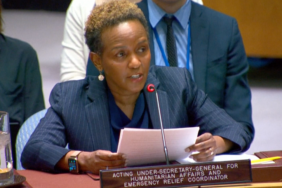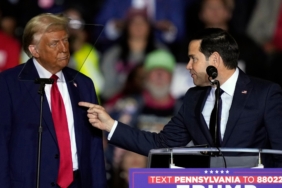A “weed” sign advertises a cannabis dispensary in Los Angeles. With a new Trump administration coming into the White House, marijuana could remain on a path toward relaxed federal restrictions.
Mario Tama/Getty Images
hide caption
toggle caption
Mario Tama/Getty Images
President-elect Donald Trump is expected to come to the White House with a laundry list of policies he wants to change or reverse. The Biden administration has moved to ease longtime restrictions on cannabis — so, what might Trump’s arrival mean for the push to legalize marijuana?
There are signs that cannabis could be a rare issue on which Trump carries a Biden policy forward.
President Biden’s administration has proposed removing marijuana from the list of Schedule I controlled substance and making it a Schedule III drug, a category that acknowledges medical benefits. Along with its implications for potential markets and consumers, the move would boost medical research into cannabis.
David Culver, the senior vice president of public affairs of the U.S. Cannabis Council lobbying group, tells NPR that he’s optimistic the new administration will take a similar approach to cannabis.
“We didn’t see a lot of activity from President Trump, if any at all, on cannabis reform” in his first term, Culver says. “But I think this time is going to be different.”
What has Trump said about marijuana?
Two months before the election, Trump issued a statement largely aligning himself with the Biden administration and his election opponent, Vice President Harris. In it, he affirmed that he supports legalizing the recreational use of marijuana.
“I believe it is time to end needless arrests and incarcerations of adults for small amounts of marijuana for personal use,” he said in a Truth Social post. “We must also implement smart regulations, while providing access for adults, to safe, tested product.”
Trump said he would vote “yes” on Florida’s recreational cannabis ballot question (the proposed amendment fell short of its 60% threshold). And he suggested Biden’s cannabis policy might remain intact.
“As President, we will continue to focus on research to unlock the medical uses of marijuana to a Schedule 3 drug, and work with Congress to pass common sense laws, including safe banking for state authorized companies,” Trump said.
What about Project 2025?
Cannabis and marijuana aren’t directly mentioned in Project 2025, an expansive text that is seen as laying out a conservative agenda for the next Republican administration.
“The next President’s top drug policy priority must be to address the current fentanyl crisis and reduce the number of overdoses and fatalities,” the document states, citing the staggering toll of opioids.
The document emphasizes the need to take on drug trafficking organizations and disrupt the flow of illegal drugs into the U.S.
A Republican administration “must reaffirm a commitment to preventing drug use before it starts, providing treatment that leads to long-term recovery, and reducing the availability of illicit drugs in the United States,” it says.
How will Trump’s second term differ from his first?
“When Trump was president first time around, we had an attorney general that was absolutely — I would consider him a prohibitionist,” Culver says, referring to former Attorney General Jeff Sessions.
In early 2018, Sessions rescinded an Obama policy that had directed federal prosecutors not to prioritize enforcing cannabis laws — a move that triggered concerns that the central government might crack down in states where cannabis laws diverged from U.S. law.
“I don’t think we’re going to have that this time around,” Culver says. “I think that the president is going to appoint someone that takes a more neutral position and/or pro position on cannabis reform. And we’re going to have people inside this administration like Robert F. Kennedy Jr., who are going to have a prominent role that are pro-legalization champions.”
Despite Sessions’ strong opposition to cannabis, Trump said in 2018 that he “probably will end up supporting” bipartisan legislation to let states craft their own laws on marijuana.
Culver says that Trump’s perspective seems to center on public safety and creating a regulated market — while keeping cannabis away from kids.
An email to the Trump campaign seeking details about the incoming president’s plans for cannabis in his second term did not get a reply before this story published.
A Trulieve employee wears a T-shirt in support of Amendment 3 in Florida, a ballot initiative which would have legalized the recreational use of pot in the state for adults 21 years old and older.
Rebecca Blackwell/AP/AP
hide caption
toggle caption
Rebecca Blackwell/AP/AP
Is the states’ momentum slowing on cannabis?
Coming into Election Day, 24 states plus the District of Columbia had legal recreational pot laws on the books. That number remains the same: ballot bids failed in Florida and also in South Dakota and North Dakota — two states where voters have repeatedly rejected legal weed.
Opponents warn of potential health risks from marijuana use. They also accuse cannabis companies of profiteering, and they say they want to wait for a shift in national policy.
Florida’s Amendment 3, legalizing cannabis, was backed by a campaign that spent more than $150 million, with most of that money coming from large medical marijuana company Trulieve, according to member station WUSF. Trump backed the measure — but Gov. Ron DeSantis mounted a determined campaign against both it and an abortion amendment.
“[DeSantis’] chief of staff, James Uthmeier, chaired two committees that raised more than $30 million to fight the two proposals,” WUSF reports.
“I don’t think there’s ever been one company that’s put in this much money for one ballot measure in all of American history,” DeSantis said of Amendment 3. He accused Trulieve of seeking a lucrative monopoly, noting that the measure wouldn’t allow people to grow their own cannabis plants.
What about the timing?
Nebraska voters approved medical marijuana last week, leaving Idaho and Kansas as the only states without a legal cannabis program for medical and/or recreational use, according to the CDC.
Legalizing cannabis has been a lucrative policy shift for U.S. states: In 2023, their cannabis tax revenue topped $4 billion — a record — according to the Marijuana Policy Project.
With more Americans reporting regular marijuana use in recent years, the National Academies of Sciences, Engineering and Medicine said in September that federal and state governments need to fill in the gaps in regulation and standardization, warning that the lack of clear and reliable information poses a risk to the U.S. public.
“I don’t think that the Biden administration will be able to finish the work that they started in October of 2022 on scheduling reform,” Culver says. “And I think it’ll be up to President Trump and his administration to pick it up and finish it at some point in 2025. And I expect him to do so.”
Culver says he doesn’t think cannabis will be a top priority for Trump as he takes office. As for what a Trump-era cannabis policy might look like, he suggests the federal government might form a regulatory structure that leaves “the bulk of the regulations to the states, just like we do with beverage alcohol.”










Yorumlar kapalı.